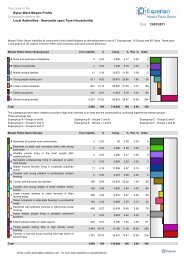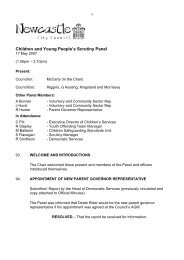Safe Newcastle Domestic Violence Strategy - Newcastle City Council
Safe Newcastle Domestic Violence Strategy - Newcastle City Council
Safe Newcastle Domestic Violence Strategy - Newcastle City Council
Create successful ePaper yourself
Turn your PDF publications into a flip-book with our unique Google optimized e-Paper software.
5. The forum should have a mix of statutory and<br />
voluntary sector representatives at a senior<br />
enough level to aid the implementation of<br />
decisions and the strategy action plan. The<br />
Forum should be formalised as part of the Crime<br />
and disorder Partnership.<br />
6. The information-sharing protocol must<br />
facilitate the exchange of information to enable<br />
domestic violence to be effectively tackled<br />
across all statutory agencies. Key statutory<br />
agencies are defined as the police, health,<br />
housing, social services and education. The<br />
protocol will also provide an opportunity to<br />
implement homicide reviews where appropriate.<br />
It must ensure that confidentiality and victim<br />
safety is protected.<br />
7. A sanctuary type scheme must provide<br />
security measures to allow the woman to remain<br />
in her home where she chooses to do so, where<br />
safety can be guaranteed and the violent partner<br />
no longer lives within the home. It must be<br />
available across tenures where the landlord<br />
of a property has given permission for the work<br />
to be carried out.<br />
It must consist of additional security to any main<br />
entrance doors to the accommodation and locks<br />
to any vulnerable windows. Wherever possible it<br />
must provide a safe room in the home secured<br />
with a solid core door and additional locks. It is<br />
essential that the service is only provided where it<br />
is the clear choice of the victim. The scheme<br />
should be implemented through partnership with<br />
the police and/or the voluntary sector that could<br />
provide supplementary support. It may be<br />
provided directly by the local authority or through<br />
a third party funded as part of the local authority’s<br />
homelessness prevention work through grants<br />
that may be available for crime reduction<br />
initiatives.<br />
8. The indicator is met if there is a percentage<br />
reduction in homelessness acceptances due to<br />
domestic violence. Acceptances who were<br />
previously homeless in another local authority area<br />
should not be included. Reductions achieved in<br />
preventing repeat homelessness should be clearly<br />
linked to positive measures adopted to provide<br />
genuine alternatives for women to either remain<br />
in their own home or be placed in alternative<br />
accommodation, removing the need to become<br />
homeless. Alternative accommodation may be<br />
secured by arranging a reciprocal property with<br />
another social landlord, or a safe management<br />
transfer. Any options or measures to prevent<br />
repeat homelessness must only be taken with the<br />
full consent of the victim of domestic violence.<br />
9. Any clause should make clear that evidence of<br />
domestic violence for eviction purposes does not<br />
need to rely on a criminal charge. Evidence may be<br />
based on a possession action using civil evidence.<br />
10. The domestic violence education pack must<br />
have been specifically designed for use in schools<br />
and with youth groups. It must aim to challenge<br />
attitudes of tolerance to violence and help young<br />
people to achieve positive relationships based on<br />
mutuality and respect. Schools and youth groups<br />
cannot be forced to run a programme on domestic<br />
violence but the pack must be easily available and<br />
actively promoted. Schools should be encouraged<br />
to use the material as part of their PSHE79 or<br />
Citizenship curriculum.<br />
11. The training programme must cover domestic<br />
violence awareness training, the legal framework,<br />
information sharing, and who provides what<br />
services to victims of domestic violence with<br />
referral and contact points. The programme<br />
should be developed in consultation with the<br />
<strong>Domestic</strong> <strong>Violence</strong> Forum and reviewed by the<br />
forum annually.<br />
<strong>Newcastle</strong> <strong>Domestic</strong> <strong>Violence</strong> And Abuse <strong>Strategy</strong> 2












